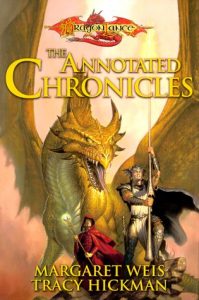 When I was a wee lad, I read a ton of those AD&D Dragonlance books, pretty well indiscriminately. There came a time in my late teens when I realized that some, okay most, of the books in that setting were pure crap, and that they didn’t actually have to be suffered through in order to know the entire story. Ultimately, books written by authors who didn’t create the characters I was trying to read about, in which the characters did completely ridiculous things that they probably would never have done anyway and certainly would have mentioned doing… these kinds of books could be ignored. It was a pretty happy day, when I finally worked that out for myself.
When I was a wee lad, I read a ton of those AD&D Dragonlance books, pretty well indiscriminately. There came a time in my late teens when I realized that some, okay most, of the books in that setting were pure crap, and that they didn’t actually have to be suffered through in order to know the entire story. Ultimately, books written by authors who didn’t create the characters I was trying to read about, in which the characters did completely ridiculous things that they probably would never have done anyway and certainly would have mentioned doing… these kinds of books could be ignored. It was a pretty happy day, when I finally worked that out for myself.
The thing is, though, I still think that the Weis and Hickman originals (10 now, plus several short story collections and a handful separate from each other) are generally quite good. Rough around the edges early on, perhaps slightly overflowing with bile towards Wizards of the Coast near the end, but on the whole filled with likeable characters having interesting stories in a setting that I’ve always enjoyed. Naturally, then, I’d want to read about all the little notes and thoughts and stories the authors had about creating the series, once I knew it was available.
In the end, it was pleasant I liked the books well enough to enjoy a reread. There’s quite a bit of interesting material, don’t get me wrong. The problem is that the majority of the material is added by a person I’ve never heard of, probably in marketing, who exists to point out when a throwaway reference to an event or character was eventually written into a book that you-the-consumer ought to go out and buy and read now. Plus, most of Tracy Hickman’s commentary in the first book revolves around explaining exactly how D&D the game went about creating the early situations. Given that it’s the single weakest element of their work, I think that the knowledge is both fairly common by now and also not particularly worth dwelling on.
So, what I got out of it was quite a few good anecdotes from people involved in the project, some poetry analysis from the guy who added the poetical elements (well, obviously), a very few glimpses into the creative process itself (somewhat moreso into the processes, creative and otherwise, of working for a book farm like TSR in those days), and answers to a few questions I’d often wondered about. Not bad as an excuse to read for a few weeks without having to turn my brain on while still being guaranteed reading pleasure out of the process.